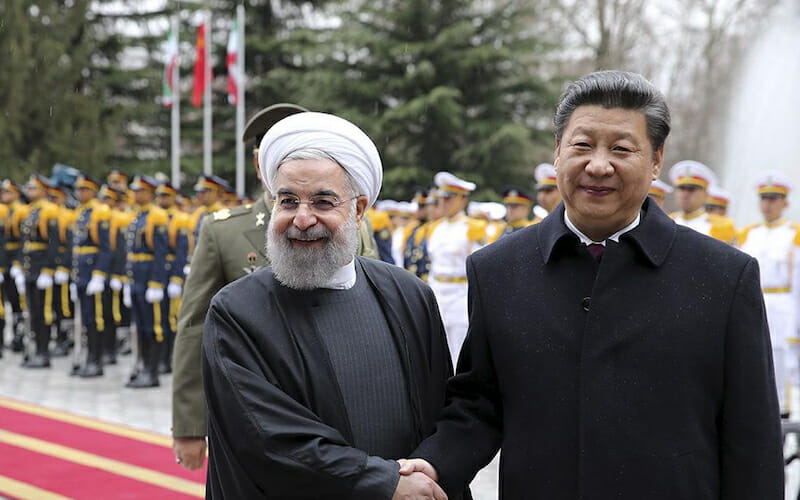
China’s Military Shift in the Middle East
China has had an active presence in the Middle East for the past two decades. Historically however, China’s presence in the Middle East has been primarily “soft,” implementing humanitarian aid, infrastructure projects, and since 2013, economic development enterprises, to fulfill the One Belt One Road initiative. In the past three years however, China’s approach to the Middle East has shifted, and the country seems intent on having a military footprint in the Middle East. This shift in Chinese foreign policy towards the Middle East might have a stabilizing effect on the Middle East, and in turn might symbolize another step towards the decline in the United States hegemony.
In 2016, China provided military assistance to Syria in addition to humanitarian aid. There are currently approximately 1,000 Chinese troops in Southern Lebanon carrying out a peacekeeping mission between Hezbollah and Israeli forces. And it was reported by AviationWeek.com on October 24th, 2017, that the United States’ reluctance towards providing unmanned aerial vehicles (UAVs) to particular Middle Eastern countries has led to big win for Chinese manufacturers in the region. This shift towards a more military-heavy approach in the Middle East should pay China some dividends.
This shift can also be observed in the orientation of the Shanghai Cooperation Organization (SCO) towards particular issues. While in the past the SCO has primarily been a multilateral economic entity, today the organization seems to be pivoting towards a having larger scope, especially in the Middle East. After the Arab Spring, and especially with the advent of the Islamic State, issues of peacekeeping, access to resources, and counter-terrorism have become larger matters on the organization’s radar. The SCO will look to increase its political clout in the Middle East as it navigates the entry of Iran into its ranks with the GCC.
As part of their military shift, China has also identified a critical window of opportunity. The United States has had its hand in the Middle East for a number of years, and has failed to gain any semblance of control or stability in the region. In fact, the United States can be seen as a cause for much of the instability in the Middle East today. The United States’ sanctions on Iran through the 2015 Iran Nuclear Deal pushed the country towards China, whose economic support helped to offset the sanctions of the US. Furthermore, as of 2015, China was the second-largest oil consumer in the world only behind the United States, making countries like Iran and Saudi Arabia attractive targets as allies. The SCO has lined up Iran and Turkey as potential members, and it increases its ability to combat similar entities like NATO. Finally, American’s reluctance to use Iraqi oil after the invasion of 2003 led to the positive relationship between China and Iraq with respect to natural resources that still exists today.
If China is able to match their economic support with military might and commitment, their hold in the region will be substantial, long-lasting, and stabilizing as well. China has also committed incredible economic vigor to the Middle East. On October 19th, 2017, it was reported that China had written off $100 million of debt that Yemen was bearing, as cholera and the civil war posed economic strains on the country. The Middle East Monitor reported in September that China had sent $46 million to Egypt to help modernize its public transportation system. Furthermore, China plans to increase its trade with Iran by $600 billion over the next 10 years. China has taken the approach that establishing strong economic and cultural ties with Middle Eastern countries, and following that up with military force, can be a very effective method to creating healthy relationships in the region.
Finally, at the 19th National Congress of the Communist Party of China earlier this month, Xi Jinping stressed the importance of China’s growing role on the world stage in a notably long speech. In his address at the event, Xi Jinping touched on the relationship between Chinese expansion and increasing China’s capacity for national security endeavors. Xi Jinping’s One Belt One Road initiative as well as the SCO and other multilateral organizations that China is a part of will be working towards this end in the foreseeable future as well.
As terrorism continues to ravage the Middle East, China’s influence in the region will continue to increase. The SCO will become a greater counter-terrorism force as more countries opt to join the organization. China will increase their military presence in the region, showing commitment and intent for long-lasting control. And this is no surprise. Since the Comprehensive Test Ban Treaty in 1996, China has been aligned with Iran, Egypt, and other Middle Eastern countries. The Middle East has long been an arena for the United States and Russia to inject their own predilections into the region. The advent of Chinese power, and arrival of the SCO as a real economic and political force, will provide stability to the Middle East and will challenge NATO and the United States hegemony. China is ready to disrupt the status quo bias that exists in the Middle East and it may very well be what is needed in the region.

